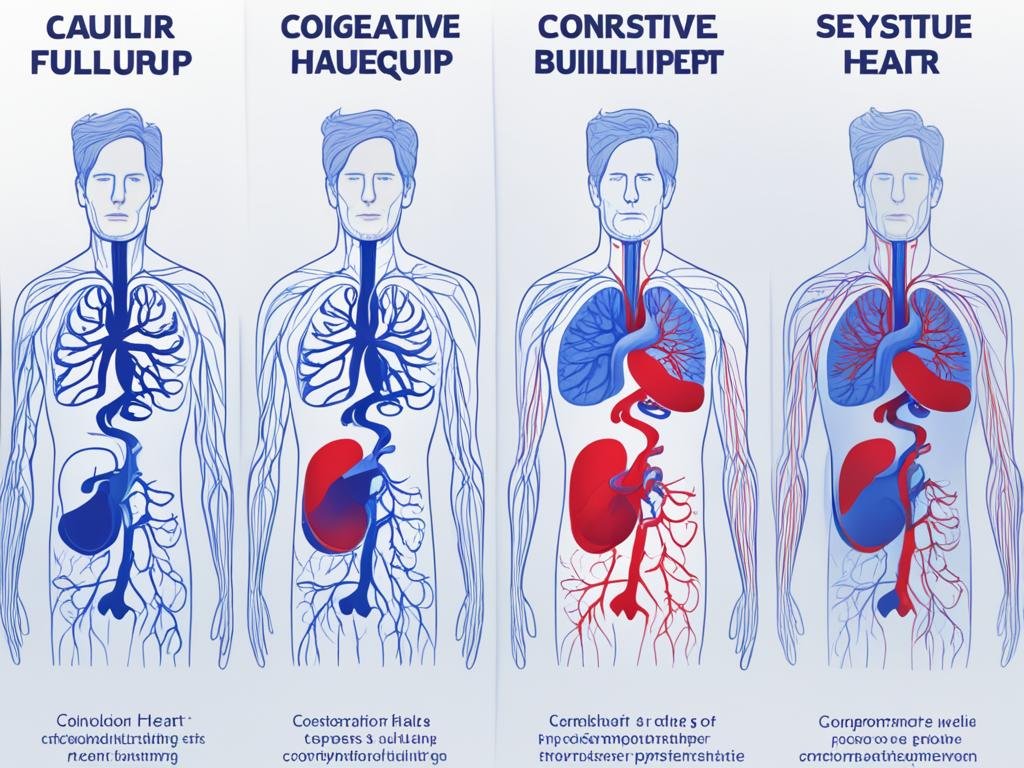Are you or a loved one struggling with the challenges of congestive heart failure (CHF)? You’re not alone. This serious condition affects millions of Americans, and understanding how to effectively manage it can make a world of difference in quality of life. But what are the most impactful strategies for managing CHF? Let’s dive in and explore the key steps to take control of this complex heart condition.
Key Takeaways
- Congestive heart failure is a serious condition where the heart can’t pump blood effectively, leading to a buildup of fluid and reduced oxygen supply to the body’s organs.
- Managing CHF requires a comprehensive approach, including lifestyle changes, medication adherence, and close monitoring of symptoms.
- Dietary modifications, such as limiting sodium and fluid intake, are crucial for managing CHF and preventing complications.
- Regular physical activity, tailored to individual abilities, can help improve heart function and quality of life for those living with CHF.
- Emotional and mental health support are vital for coping with the challenges of living with a chronic heart condition.
Understanding Congestive Heart Failure
Congestive heart failure is a long-term condition that occurs when the heart is unable to pump blood effectively, resulting in a diminished supply of oxygen-rich blood to the body’s organs. This condition leads to the accumulation of blood and fluids in the lungs and legs over time. To avoid the development of congestive heart failure, it is crucial to address the underlying factors that contribute to the condition, such as smoking, an unhealthy diet, being overweight, and other heart-related diseases or conditions.
What is Congestive Heart Failure?
Congestive heart failure is a chronic condition in which the heart is unable to effectively pump blood throughout the body, resulting in a diminished supply of oxygen and nutrients to the body’s organs. This can lead to a range of symptoms, including shortness of breath, fatigue, and swelling in the legs and feet.
Causes and Risk Factors
The leading causes of heart failure include conditions that damage or weaken the heart, such as coronary artery disease, high blood pressure, and certain types of heart disease. Other risk factors for heart failure include smoking, an unhealthy diet, being overweight, and a sedentary lifestyle. Ongoing care and adherence to prescribed medications, such as statin drugs to treat high cholesterol, can make a significant difference in preventing the development of congestive heart failure.
Symptoms of Congestive Heart Failure
Recognizing the signs and symptoms of congestive heart failure is crucial for managing this chronic condition effectively. The congestive heart failure symptoms can vary in severity and progression, and it’s important to be aware of both the common signs as well as the indicators that the condition may be worsening.
Common Signs and Symptoms
The most common heart failure signs include shortness of breath, especially during physical activity or when lying down, persistent fatigue, swelling in the legs and feet, and a persistent cough or wheezing. Individuals with congestive heart failure may also experience a loss of appetite, confusion, and an increased need to urinate at night.
Recognizing Worsening Symptoms
As congestive heart failure progresses, worsening heart failure symptoms may emerge, which can indicate that the heart is failing to pump blood effectively. These include difficulty breathing when lying down, a marked increase in swelling, persistent coughing or wheezing, and a lack of appetite or confusion. Recognizing these worsening signs is critical, as it signals the need for immediate medical attention to prevent further complications.

Diagnosis and Testing
Diagnosing congestive heart failure often involves a multifaceted approach, as there is no single definitive test. Healthcare providers will typically consider a patient’s medical history, family history, and the results of various heart failure tests and diagnostic procedures.
Physical Examination
The first step in diagnosing congestive heart failure is a thorough physical examination. During the exam, the doctor will listen to the heart and lungs, check for swelling in the legs or abdomen, and assess the patient’s overall health status.
Diagnostic Tests
To confirm a congestive heart failure diagnosis, the doctor may order a variety of heart failure tests, including:
- Electrocardiogram (EKG) to measure the heart’s electrical activity
- Chest X-ray to look for an enlarged heart or lung damage
- BNP blood test to measure a hormone that indicates heart failure severity
- Echocardiogram to create an ultrasound image of the heart
- Holter monitor to track the heart’s electrical activity for a day or two
- Exercise stress test to see how the heart performs under exertion
These diagnostic procedures provide valuable information to the healthcare team, allowing them to develop an appropriate treatment plan for the patient’s unique needs.
Treatment Options for Congestive Heart Failure
Managing congestive heart failure (CHF) requires a multifaceted approach, combining lifestyle modifications, medications, and in some cases, surgical interventions. The primary goal of treatment is to alleviate symptoms, slow the progression of the disease, and improve overall quality of life.
Lifestyle Modifications
Adopting a healthy lifestyle is a crucial component of CHF treatment. This includes following a heart-healthy diet, limiting salt and fluid intake, and engaging in regular physical activity as tolerated. These lifestyle changes can help manage symptoms, reduce the risk of hospitalization, and potentially slow the worsening of heart failure.
Medications
Numerous medications are commonly prescribed to manage CHF, including vasodilators to expand blood vessels, diuretics to correct fluid retention, ACE inhibitors or ARB drugs to improve heart function, and beta-blockers to enhance heart function and survival.
Surgical Interventions
In more severe cases of CHF, surgical procedures may be necessary to address the underlying cause or manage the condition. These interventions may include opening or bypassing blocked arteries, replacing heart valves, or using a pacemaker or ventricular assist device. In some cases, a heart transplant may be considered as a last resort.

Managing Congestive Heart Failure Through Diet
Adopting a heart-healthy diet is a crucial component of managing congestive heart failure (CHF). By making strategic dietary choices, individuals with CHF can help improve their overall well-being and potentially slow the progression of the condition.
Heart-Healthy Dietary Recommendations
When it comes to a heart-healthy diet for heart failure, the focus should be on consuming more fruits, vegetables, low-fat dairy, lean proteins, and “good” fats like those found in olive oil, fish, and avocados. These nutrient-dense foods can help support cardiovascular health and provide the essential nutrients the body needs. Limiting salt, sugar, and saturated and trans fats is also crucial, as these can exacerbate the symptoms of congestive heart failure.
Fluid and Sodium Intake
For individuals with CHF, fluid and sodium intake may need to be carefully managed, as excess fluid can accumulate in the lungs and legs, further straining the heart’s ability to function effectively. Doctors will provide personalized guidelines on the appropriate congestive heart failure diet and fluid/sodium limits based on the individual’s specific needs and stage of the condition.
Exercise and Activity for Congestive Heart Failure Patients
Regular physical activity is crucial for individuals living with congestive heart failure, as it can help improve heart function, reduce troubling symptoms, and enhance overall quality of life. However, the type and intensity of exercise must be carefully tailored to the patient’s specific abilities and stage of heart failure. Patients should work closely with their healthcare team to develop an appropriate exercise plan that meets their unique needs.
For many patients, the exercise regimen may start with light activities like walking, and gradually increase in duration and intensity as the individual’s condition allows. This gradual approach helps ensure the patient’s safety and comfort while gradually improving cardiovascular fitness. Resistance training and other forms of moderate exercise may also be incorporated as the patient’s stamina increases.
| Benefits of Exercise for Congestive Heart Failure Patients | Considerations for Designing an Exercise Plan |
|---|---|
|
|
By working closely with their healthcare team to develop a customized exercise program, congestive heart failure patients can take an active role in managing their condition and improving their overall well-being. Regular physical activity, when done safely and under medical supervision, can be a powerful tool in the comprehensive treatment of this chronic heart condition.
Monitoring and Tracking Congestive Heart Failure
Effectively managing congestive heart failure requires vigilant monitoring and tracking of symptoms. As the condition worsens over time, it is essential for patients to stay attuned to changes in their physical well-being and report any concerning developments to their healthcare team.
Importance of Monitoring Symptoms
Closely monitoring heart failure symptoms such as weight fluctuations, swelling, shortness of breath, and other warning signs can help patients and their doctors identify potential complications early and make timely adjustments to treatment. By staying proactive, individuals with congestive heart failure can work to slow disease progression and prevent serious health events.
Self-Care and Compliance
In addition to symptom monitoring, self-care and compliance with prescribed medications, dietary recommendations, and other lifestyle modifications are crucial for managing heart failure. Adhering to the treatment plan set forth by one’s healthcare providers can make a significant difference in maintaining quality of life and preventing heart failure exacerbations.
| Key Aspects of Heart Failure Monitoring and Self-Care | Description |
|---|---|
| Symptom Tracking | Monitor changes in weight, swelling, shortness of breath, and other warning signs of worsening heart failure. |
| Vital Sign Monitoring | Track blood pressure, heart rate, and other vital indicators as directed by healthcare professionals. |
| Medication Compliance | Adhere strictly to the prescribed regimen of heart failure medications. |
| Dietary Adherence | Follow the recommended heart-healthy diet and fluid/sodium intake guidelines. |
| Activity and Exercise | Engage in appropriate physical activity as approved by the healthcare team. |
By making self-care a priority and closely monitoring heart failure symptoms, individuals with congestive heart failure can play an active role in managing their condition and improving their overall health and well-being.
Emotional and Mental Health Support
Coping with congestive heart failure can take a significant emotional and mental toll on patients. The condition’s life-limiting nature can lead to feelings of anxiety, depression, and stress. To manage these challenges,
it’s important for heart failure patients to explore effective coping strategies, such as joining a heart failure support group, practicing relaxation techniques like meditation or deep breathing, and seeking counseling or therapy from mental health professionals.
Coping Strategies
Joining a local or online support group can provide emotional support and help heart failure patients feel less alone in their struggles. These groups offer a safe space to share experiences, learn coping techniques from others, and receive encouragement from those who understand the unique challenges of living with congestive heart failure.
In addition to support groups, practicing relaxation methods like yoga, guided imagery, or mindfulness can help manage stress and anxiety associated with the condition. Heart failure patients should work closely with their healthcare team to develop a comprehensive plan to address their emotional and mental health needs.
Support Groups and Resources
There are numerous resources available to provide emotional support and coping strategies for individuals living with congestive heart failure. Many hospitals and heart health organizations, such as the American Heart Association, offer support groups and counseling services specifically for heart failure patients. Online communities and forums can also be valuable sources of peer-to-peer support and information.
Healthcare providers may also recommend medications or other interventions to address any mental health concerns that arise in heart failure patients. By taking a proactive approach to emotional and mental well-being, individuals with congestive heart failure can improve their overall quality of life and better manage the challenges of this chronic condition.
Latest Research and Advancements
Johns Hopkins researchers are leading the way in the study of congestive heart failure, with recent findings that shed new light on the condition. One key discovery is that African-Americans face a higher risk of heart failure due to underlying factors like diabetes and high blood pressure, rather than race alone. This important insight could help healthcare providers tailor their approach to prevention and management for this population.
Additionally, researchers have found that a simple blood test can predict which patients are more likely to be readmitted to the hospital after being discharged. This information can be invaluable for healthcare teams, allowing them to develop more personalized treatment plans and follow-up care strategies to improve outcomes for heart failure patients.
Ongoing research continues to explore innovative ways to enhance the quality of life and treatment options for individuals living with congestive heart failure. As the medical community expands its understanding of this complex condition, new advancements in heart failure treatment offer hope for better management and improved prognosis for those affected.
Conclusion
Congestive heart failure is a serious, but manageable, condition that requires a comprehensive approach to managing congestive heart failure and self-care. By making lifestyle changes, taking prescribed medications, and closely monitoring symptoms, individuals with heart failure can work to slow the progression of the disease and improve their overall living with heart failure. While there is currently no cure, continued research and advancements in medical treatments offer hope for better management and outcomes for those living with this challenging condition.
Maintaining a healthy diet, staying physically active, and adhering to prescribed treatments are all crucial steps in effectively managing congestive heart failure. By working closely with their healthcare team, patients can develop a personalized plan to address their specific needs and concerns, ultimately leading to a better quality of life.
As researchers continue to explore new avenues for treating and managing congestive heart failure, those living with the condition can take comfort in the progress being made and the promise of even more effective therapies on the horizon. With a proactive and collaborative approach to their care, individuals with heart failure can find ways to navigate the challenges and live fuller, more fulfilling lives.

